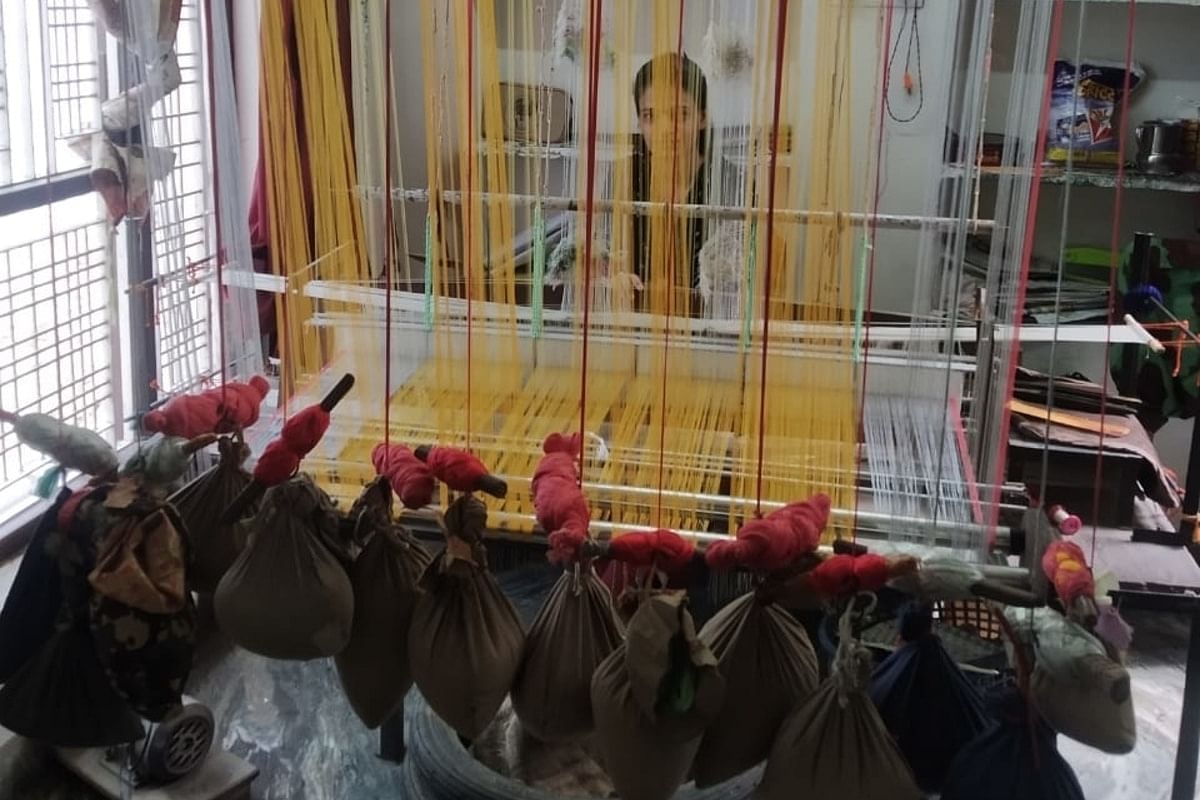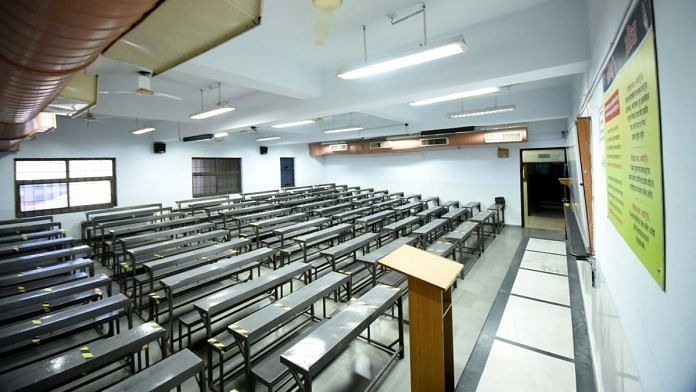Kota: Ashutosh Yadav, a 17-year-old from Ghaziabad, is sitting on the terrace of his four-floor hostel building in Kota. He is in town to prepare for the IIT-JEE entrance examination. But Yadav is missing the comfort and ease physical classes offered.
A student of Allen Career Institute, which is located just a kilometre from his hostel, Yadav says, “We had returned only in January hoping things would get back to normal but this seems endless.”
With classes across the engineering and medical coaching hub in Rajasthan shut for an indefinite period, Yadav’s friend, Rishu Raj, 20, is also unable to decide what to do. Raj’s parents want him to return home in Bhopal at the earliest. “But I feel distracted at home, it’s easier to focus in this environment here,” he tells ThePrint.
Yadav and Raj are among the 13,000 students who are currently in Kota, data from the district administration shows.

This is a significant fall from the 1.35 lakh students who took physical courses in 2019. At least 50,000 of them were evacuated in March 2020 ahead of the national lockdown in special trains, official records of Kota administration revealed. Around 10 per cent of them remain in the city.
Now, Rajasthan is under a lockdown until 17 May, which initially began as a weekend curfew in the middle of April. Kota’s coaching institutes closed on 16 April, and have remained shut since. The lockdown was extended by a fortnight.
This has hit the city’s coaching industry, affecting the livelihoods of many, who were already dealing with the costs of the first wave of the pandemic.
Also read: CM to sarpanch, how Rajasthan pulled together to beat vaccine fear, become top performer
The Kota industry
The coaching industry in Kota directly or indirectly impacts the livelihoods of at least 2 lakh people in the city, including its 3,000 hostel and 20,000 paying guest (PG) accommodation owners, local vendors, shopkeepers, mess staff, auto drivers, security guards and so on.
The closure of these institutes has impacted Kota’s economy dependent on them.
“Revenue worth Rs 3,000 crore was earned in 2019 through the coaching centres and the stakeholders dependent on them in Kota, which reduced to about Rs 1,500 crore in the past one year,” says Vinod Kumawat, senior vice president, Allen Career Institute, Kota. He has been in the coaching business for 33 years.
Many of these stakeholders are worried about the rising Covid cases in Rajasthan. On Monday, the state reported 17,296 cases and 154 deaths.
According to data obtained from the district magistrate (DM)’s office, Kota’s positivity rate rose from 11.12 per cent on 1 April to almost 38 per cent on 30 April.
While the state bulletin showed that Kota reported 762 Covid cases Friday on 30 April, the data for the day from the DM’s office showed 1,526 cases.
Explaining this discrepancy, DM Ujjval Rathore says: “The 1,526 figure is that from laboratories, includes repeat tests as well as those of outsiders.”
Owners of coaching centres have asked government officials to let them reopen with safety measures in place. Hostel owners argue that if by-elections could be held in April, coaching institutes must also be allowed to operate.

Kota will become ‘suicide hub’, say business owners
However, the empty, tall, brick campuses that welcome visitors to Kota are testimony to the gloom that has hit the city. From the usual heavy rush of students from all over the country, the hostels and PGs now lie deserted.
Sunil Agarwal, a hostel owner, says, “We have taken so many measures to ensure safety of students… why must the government not consider reopening centres once?”
From regular sanitisation to checking temperature of students daily to creating a separate isolation facility in the hostel, Agarwal lists them out.
“We have even provided pulse oximeter and kettles for steam to each of our students as we also care for their safety,” he says, adding desperately: “More than a coaching hub, Kota will soon be known as ‘suicide hub’ for us as we won’t survive this way.”
Naveen Mittal, chief of the local Kota Hostel Association, says, “We took loans last year as well. We haven’t been able to repay those and this year seems to be making it tougher for us.”
Some of the hostels have anyway been operating at 30 per cent capacity since students returned in January.
Teena Sharma, warden at Adarsh Boys Hostel in Kota, shares that out of a total of 110 rooms at her hostel, 59 were occupied as of 30 April. “But many boys want to leave with the lockdown extended in Rajasthan.”
The hostel has also converted its fourth floor into a quarantine floor where any student who shows symptoms is isolated.
Auto driver Monu Lal, a regular outside this hostel, is also suffering the consequences. “We used to earn at least Rs 700 to 800 a day when children were in the town. Now, we barely make Rs 80-100 on a good day,” Lal tells ThePrint, with his auto parked under a tree.
In another girls’ PG accommodation, four girls who learnt about the JEE-Advanced getting postponed, are packing their bags to leave.
“I don’t know when things will be back to normal so I’ve decided to be with my grandparents in Odisha till then,” says an engineering student of Career Point Coaching Institute.

“Migration of students has started even though at least 30,000 students returned in November last year. We have advanced the summer vacation this year,” says Pramod Maheshwari, director, Career Point Coaching Institute.
Nearly 5,000 faculty members, including administrative staff, are also impacted. Salaries of faculty at various institutes have been reduced by 10-25 per cent, coaching centre owners confirm to ThePrint.
State Health Minister Raghu Sharma, however, tells ThePrint: “Loss of industrial resources can be made up for. But a lost life won’t come back. Kota is among our worst impacted districts and needs to remain under lockdown. At this point, saving lives is the government’s priority.”
Also read: How India’s high courts turned Covid warriors as Centre and states faltered
Turn to innovative modes for survival
Stationery shop owners in Kota claim lack of students is making them shut shop.
Rakesh Kumar Jain, president, General Merchants Association, Kota, says: “All kinds of businesses have been hit, stationery shops were a big business in this city, now some of the stationery shops owners have been coming to me saying they are shutting shop.”
Jain adds that they are now looking at alternate ways of doing business, including the online mode.
Such moves are being seen among others too.
Manoj Sharma, for example, took over as the CEO of Vibrant Academy, one of the better known coaching institutes in Kota, after working with rival group Resonance for over 18 years. The reason, he says, is his new employer’s tie-up with Unacademy, an education start-up backed by tech giant Facebook with a valuation of over $2 billion.
Speaking to ThePrint, Sharma says: “There is too much uncertainty since we thought things will improve with children returning in January but now things are worse than last year.” He adds that he was thinking of more tech driven solutions to retain student’s focus for exam preparation.
Similarly, Motion Education Pvt. Ltd is now thinking of ways to address each student’s needs separately. “Our content was the same based on the entrance examination but Covid has given us time and we’re thinking of offbeat solutions to look at each student’s need individually and address those though pre-recorded sessions through online platforms,” says Nitin Vijay, who is the director of the institute.
Also read: How Bhilwara is using lessons learnt from its 2020 ‘model’ to fight this Covid wave
Other industries hit too
But the coaching industry isn’t the only sector that has been impacted in the city. Kota is also home to weavers. At least 3,000 looms in Kaithoon municipality, where the much talked about Kota Doria sarees are woven, have been severely hit.
With uncertainty over when there will be buyers again, Shabbir Hussain Ansari, owner of one such yarn business, says: “The production has been going on, but I haven’t had a single buyer in the past fortnight.”

The curfew has also come at the peak sale season for the Kota Doria weavers, as these sarees are popular during the summer wedding season in parts of southern India.
The stone and fertiliser industry in Kota has also been badly hit as it is dependent on oxygen supply.
Govind Ram Mittal, a renowned industrialist in Kota and owner of Mittal Dhatu, one of India’s oldest and largest producers of metallic stearates, says the turnover of industrial output had reduced by 50 per cent amid the second wave.
“The industrial sector had incurred 75 per cent losses from original turnover of Rs 2,000 crore (before the pandemic hi). However, we managed to make up 25 per cent when the industrial production began,” he says, adding that with the latest surge in cases and curfew, it was down to Rs 1,000 crore once again.
Kota houses at least 14,500 MSMEs too. Achal Poddar, who is the owner of Chambal Stone Cluster Pvt. Ltd as well as the secretary of Rajasthan chapter of Laghu Udyog Bharati, says: “Each of these 14,000-15,000 MSMEs in Kota generate at least Rs 2 to 3 crore annually as revenue, but in 2020 this was impacted by at least 30 per cent.”
According to him, the uncertainty is even more this time. “Our stone industry involves construction work and hence labour is key, which we deprived off,” Poddar says, adding that grazing work in such industries requires oxygen supply.
“Here, people aren’t able to get oxygen, let alone us. So we would rather let the industry suffer then people’s lives. I can’t explain how it feels,” he adds.
(Edited by Amit Upadhyaya)
Also read: India’s vaccine shortage threatens to prolong its Covid crisis



